Home Inspectors: Here Are Your New Year’s Resolutions
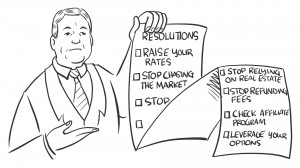 First, let’s get the “Happy New Year!” salutation out of the way. My team and I wish you the very best in 2017. I suggest you follow these New Year’s resolutions to get the most out of your business and make the best use of your time in 2017. 1. Raise your rates: This is something I learned in my first job at a Philadelphia “white shoe” law firm. On January 1, every lawyer’s hourly rates increased by $10 or $15. I still implement this practice to this day. Every business raises its rates for “inflation”, and you should too. 2. Stop chasing the market down: Stick to your guns. If you continually lower your rates to match the competition, you are supporting the notion that one inspector is as good as another. You know that isn’t true. Cheap Charlie is cheap for a reason. So instead of lowering your business to that level, provide value-add reasons why your product is worth more. Watch this video to discover other New Year’s resolutions you should implement in 2017. (more…)
First, let’s get the “Happy New Year!” salutation out of the way. My team and I wish you the very best in 2017. I suggest you follow these New Year’s resolutions to get the most out of your business and make the best use of your time in 2017. 1. Raise your rates: This is something I learned in my first job at a Philadelphia “white shoe” law firm. On January 1, every lawyer’s hourly rates increased by $10 or $15. I still implement this practice to this day. Every business raises its rates for “inflation”, and you should too. 2. Stop chasing the market down: Stick to your guns. If you continually lower your rates to match the competition, you are supporting the notion that one inspector is as good as another. You know that isn’t true. Cheap Charlie is cheap for a reason. So instead of lowering your business to that level, provide value-add reasons why your product is worth more. Watch this video to discover other New Year’s resolutions you should implement in 2017. (more…)

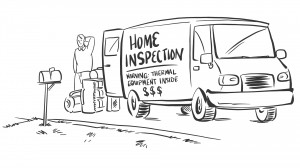 A California home inspector recently sent me an email inquiring about thermal imaging’s place in the industry, but more importantly, my legal perspective on whether the new “x-ray vision” opened up another dimension of legal liability for the inspector.
A California home inspector recently sent me an email inquiring about thermal imaging’s place in the industry, but more importantly, my legal perspective on whether the new “x-ray vision” opened up another dimension of legal liability for the inspector. A home inspector I’ve known for several years came up to me at an industry workshop with an issue: he had received a demand letter from a past client for failing to detect mold.
A home inspector I’ve known for several years came up to me at an industry workshop with an issue: he had received a demand letter from a past client for failing to detect mold.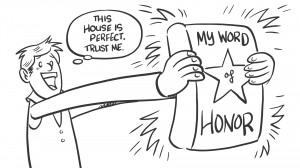 A Massachusetts home inspector recently asked me if he could rely on the information posted in the seller’s disclosures or responses provided by the seller or the seller’s representative to specific questions about the property.
A Massachusetts home inspector recently asked me if he could rely on the information posted in the seller’s disclosures or responses provided by the seller or the seller’s representative to specific questions about the property.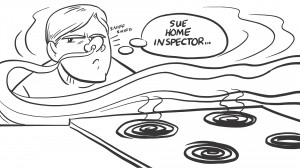 A California home inspector recently contacted me about about a claim one of his prior clients was lodging against his former inspection company – the company that conducted the inspection in question.
A California home inspector recently contacted me about about a claim one of his prior clients was lodging against his former inspection company – the company that conducted the inspection in question.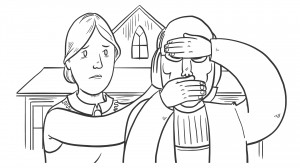 The county sheriff arrives on your doorstep. Your heart sinks. A home inspection client of yours is demanding you pay for the bad results that occurred months after your original inspection.
The county sheriff arrives on your doorstep. Your heart sinks. A home inspection client of yours is demanding you pay for the bad results that occurred months after your original inspection.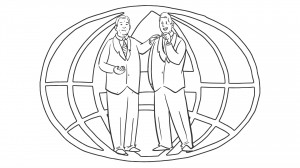 I’ve now been successfully defending home inspectors against meritless claims for a decade now, and with over 1,000 claims under my belt, I feel I’m qualified to describe the typical home inspection claim runaround competent home inspectors like yourself receive when dealing with an “issue” that really isn’t your “issue” at all.
I’ve now been successfully defending home inspectors against meritless claims for a decade now, and with over 1,000 claims under my belt, I feel I’m qualified to describe the typical home inspection claim runaround competent home inspectors like yourself receive when dealing with an “issue” that really isn’t your “issue” at all.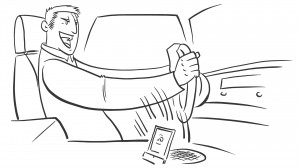 A Connecticut home inspector recently wrote to me about a “finding” he heard at a local law course, in which he has told that the American Arbitration Association (AAA) is now looking at DEFENDANTS for a substantial sum of money when a claim initiates.
A Connecticut home inspector recently wrote to me about a “finding” he heard at a local law course, in which he has told that the American Arbitration Association (AAA) is now looking at DEFENDANTS for a substantial sum of money when a claim initiates.